
The Caligula Effect: Overdose Review
When it first came out on PlayStation Vita in 2017, The Caligula Effect was decidedly not a good game. Negative reviews (including our own) and poor word of mouth cemented it as just a forgettable and skippable game for the platform. It seemed like this was something that should’ve been left alone and forgotten. And yet, not only was The Caligula Effect adapted into a TV anime, but it was also to be remade in Unreal Engine 4 and ported to PS4, Switch and PC as The Caligula Effect: Overdose. After asking myself why studio Aquria would do this, I figured there must be something special underneath all of the problems that the original release had. But is that the case?
For starters, the storyline premise of this remake is largely the same as before: your silent protagonist (who in this version can be male or female) finds out they’re trapped in a world called Mobius. This is a virtual world created by a sentient vocaloid named Mu in which everyone is living perpetually as students in an idealized high school, which is Mu’s solution to subsiding the pains of the real world. The main character soon realizes the abnormality of this world, and upon crossing paths with others who also see through the facade, they band together to form the Go-Home Club in order to try and get back to reality. However, Mu and her subordinates stand in the Go-Home Club's way towards their goal.
This remake adds a new perspective to the story: you can join Mu and her group of Ostinato Musicians, those who compose the songs she uses to retain control of the people trapped in the virtual city. On paper, this is an interesting idea that should allow you to experience both sides of the conflict while also further developing the motivations of the villains. Unfortunately, when it comes to execution, it mostly amounts to replaying dungeons to undo what you accomplished with the Go-Home Club, culminating in a very poorly written ending that might as well feature the protagonist twirling an imaginary mustache.
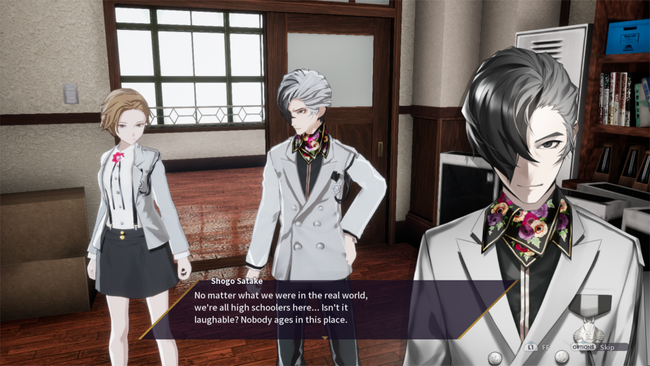
One thing that this HD remake does not improve at all is the game's dungeon traversal. Each location consists of multiple floors of very intricate mazes, but the visual design is so poor that you practically need to play with the map on full screen to not get lost. There is absolutely nothing that distinguishes one hallway from the other, and it only gets worse as the complexity of the dungeons increases since enemy placement is as bad as the dungeon design, making battles far more frequent than they should be.
As for the combat system, it doesn't fair much better in Overdose. This remake simplifies the entire interface to make it easier to read and makes better use of its preview system where you can see the exact outcome of the actions you are about to perform should they not miss. There are some interesting ideas here, like juggling enemies to activate skills that work as aerial combos, but in the end, player strategy doesn’t really matter.
While you have quite a lot of skills at your disposal, multiple party members, equipment variety, and even skill upgrade system, engaging with all of this ends up feeling like a chore. The majority of enemies are as repetitive as the dungeons, and even the most basic of attacks can deal with them without much trouble at all, ending most battles in one or two turns. In fact, thanks to the new auto-battle feature where you can have everyone except for the protagonist controlled by the AI, you can just mash your way through victory in almost every battle in the game, bosses being no exception.
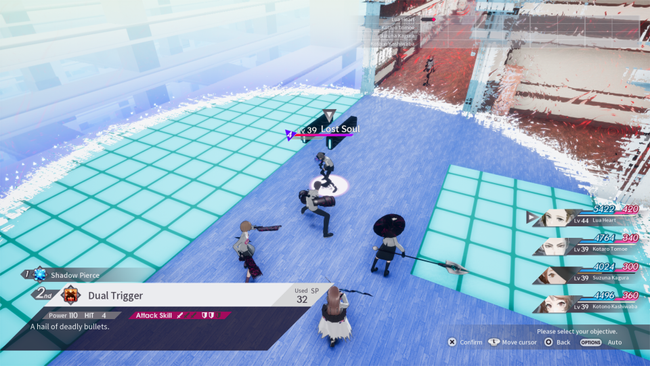
Perhaps the best thing about the dungeons, and the game in general, is the music. Given that musicians and songs are a big theme of the story, each dungeon has its own unique theme composed by popular Japanese musicians and the implementation in the game is quite good, transitioning seamlessly from an instrumental version during the dungeon crawling to a vocal version of the song during battles and using special remixes for the boss fights. Having the same music for both exploring and combat does contribute to the dungeons feeling repetitive, but the music is really good.
The same can’t be said about how the game looks. Even after remaking the game in Unreal Engine 4, all of the character models still look like they belong in a Vita game. They don’t blink, their mouths never open, they barely animate and whatever animations they have are incredibly stiff and robotic. It’s a shame, given that the game has some nice 2D art and a very clean and good looking interface. Still, whenever anything is in motion it just looks like it’s about to break. At least, unlike the original game, Overdose runs really well.
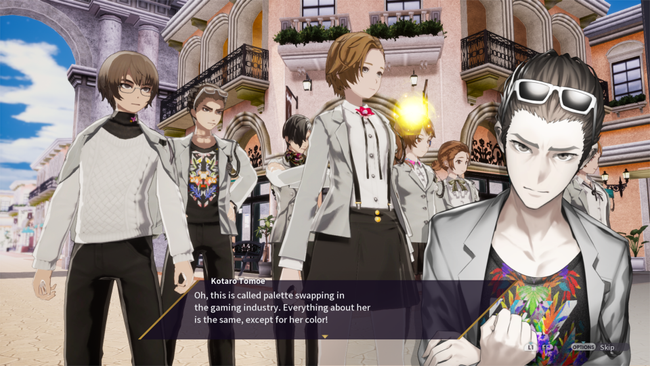
These shortcomings in the visuals end up affecting the already subpar writing, since it undermines whatever emotional hook scenes might be trying to use. However, not all of the writing is bad, thanks for the most part to the characters themselves. While far from being the most original, some of the characters can be quite entertaining.
Overdose adds two new characters to each side: two party members and two Musicians. Like the rest of the cast, some of these new characters are good, like one of the party members who is a CEO in the real world, while others are just unnecessary additions, like one of the Musicians whose whole entire deal is that he likes to peep on women.
Just like in the original game, you can deepen your relationships with the cast through the Character Episodes, Caligula’s own take on Persona’s Social Links. New to this release, however, is the option to also experience Character Episodes for all of the Musicians, who overall end up being more interesting than the main cast of the Go-Home Club, although not all of them are winners.
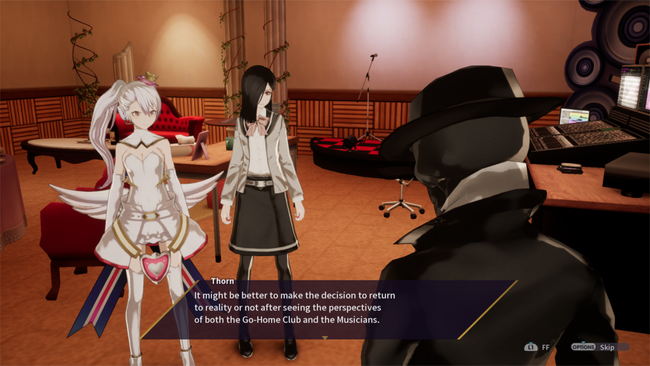
There are characters worth your time on both groups, but they pale compared to the number of poorly written or uninteresting characters. Some characters have the potential to present emotionally competent stories, but it never gets there since the game tries to handle some heavy themes and yet only does so in extremely superficial and borderline offensive ways, with subjects like eating disorders, self-harm, gender issues, or even suicide.
What is not worth the time is the Causality Link system, a returning feature of the original game. In an attempt to make interacting with NPCs interesting, the game offers you the chance to befriend over 500 characters, complete with a grid of their relationships with each other. Just like in the original, this system is entirely pointless. None of the NPCs have interesting dialogue (in fact, a lot of it is repeated), advancing your relationships with them takes forever, and the rewards, besides being negligible things like stat boosts, only come after doing extremely boring sidequests for them.
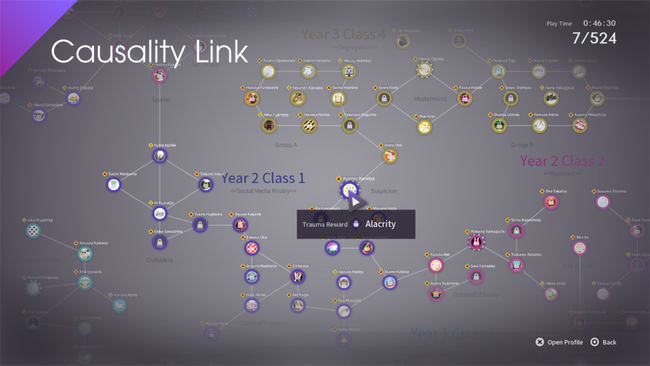
In the end, I couldn’t answer why The Caligula Effect Overdose exists. Instead of fixing some of the fundamental issues that the game had, like the combat, the writing or the animations, the remake seems to have doubled down on quantity over quality. While the game's performance is certainly better than it was on Vita, most of the other issues persist. There are more characters, but they’re only mildly interesting at best. There are more narrative beats, but it comes with the same poor writing as before. The combat is perhaps easier to understand, but it’s just as boring and there’s more of it to slog through.
There are good ideas and elements that almost make this remake worth it, and on the whole it does make some improvements over the original game, albeit slight ones. Still, perhaps it really is for the best to just let these characters go home like they want to and leave the world of Caligula behind.